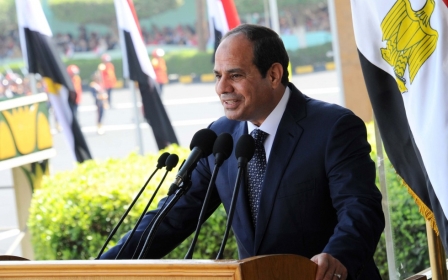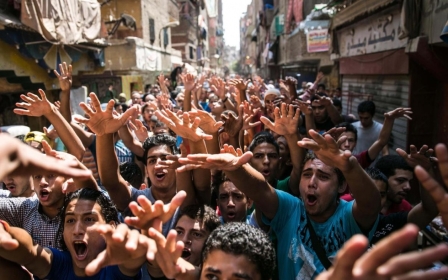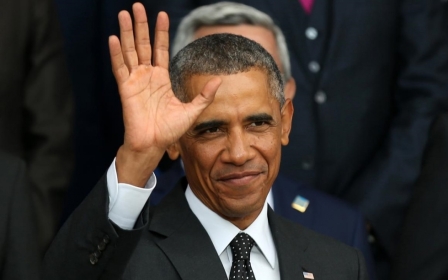Management that is doomed to fail

Sir John Sawers, head of MI6, had "lunch with the FT" recently, an idiosyncratic format in which what is eaten is almost as important as what is said. Ploughing through his sea bream (very white and appetizingly fresh), Sawers said something revealing - although it passed over the head of the editor of the FT who was concentrating on his swordfish.
Sawers compared the Arab Spring to the Iranian Revolution. He said revolutionary change was impossible to manage and would normally end up worse for western interests and values: "We saw it in Tehran in 1979, and we've seen it in Egypt over the past few years."
Tony Blair, Sawers' former boss, used similar language before Hosni Mubarak was toppled. Describing Mubarak as "a force for good," Blair had no doubt change was coming to Egypt, but went on:
People want a different system of government. They're going to get it. The question is what emerges from that. In particular I think the key challenge for us is how do we help partner this process of change and help manage it in such a way that what comes out of it is open-minded, fair, democratic government.
Both Sawers and Blair see their task as "managing" change in the Middle East. Unlike Blair, Sawers has hands on experience of the Arab world. A former ambassador in Cairo, Sawers knows the difference between an ayatollah and an elected president, between theocracy and political Islam.
He is also aware that MI6 has just given the Muslim Brotherhood a clean bill of health. The government review by Sir John Jenkins, in draft form, has absolved it of links with terrorist acts in Egypt. This conclusion has complicated the task of David Cameron, who is under pressure from the Saudis and the Emiratis to ban the brotherhood from Britain, especially after the Qataris have partially caved in to similar pressure.
By any yardstick, the conflicts of the Middle East are not being well managed. Three states have failed - Iraq, Syria and Libya - two of these as a consequence of Western intervention. Other states like Yemen are tottering. The Islamic State has carved out a substantial chunk of Syrian and Iraqi territory, and will not be easily dislodged by US or French airstrikes. If the history of fighting al-Qaeda is anything to go by, those black flags are mobile. They can relocate in other countries.
Nor is the task of assembling coalitions as straightforward as it was. Western allies in the region seem to pose even more of a problem to the US and Britain than their enemies do. Saudi Arabia, United Arab Emirates, Egypt, Jordan, are openly contemptuous of Obama for allowing Mubarak to go and not bombing Syria when chemical weapons had been used. A backseat driver during the NATO bombing of Libya, the US has been forced behind the wheel once again. But its passengers remain doubtful of America's capacity to stick to its task. As a result, they are more likely to engage in freelance operations of their own. America, their chief supplier of arms and spare parts, is left wringing its hands.
In the week in which the Saudis and Emiratis baulked at military action against Islamic State militants in Iraq and Syria, the UAE and Egypt attempted to create the conditions for a second western military intervention in Libya. For a period it seemed as if they had found a partner in the French.
The French Defense Minister Jean-Yves Le Drian called Libya a major terrorist hub on Europe's door step. "The south [of Libya] is a sort of hub for terrorist groups where they come to re-supply - including with weapons - and re-organise. In the north, the political and economic centres of the country are now at risk of falling under jihadist control," he said.
Egyptian president Abdel Fattah al-Sisi clearly referred to Libya when he spoke to John Kerry. In the words of his spokesman, Sisi stressed to Kerry "that any international coalition against terrorism must be a comprehensive alliance that is not limited to confront a certain organisation or to curb a single terrorist hotbed but must expand to include all the terrorist hotbeds across the Middle East and Africa."
All this came to naught - for the time being - when Libya's neighbors made it clear at a conference in Spain that they would not tolerate Egyptian troops and French warplanes bombing Benghazi. Algeria put its foot down, but the prospect of an Egyptian intervention is unlikely to go away, especially if General Khalifa Hafter remains in business. A third attack by unidentified war planes took place last week on the Libya Dawn militias - presumably by the same crews which launched the first two strikes, which were attributed to the UAE using Egyptian air bases.
The conflation of the Libya Dawn militias, which are made up the Misratan brigades and a variety of Islamist militias, with Islamic State militants is a deliberate tactic. Sisi is seeking international legitimacy by playing the role of the strongman who fights Islamism in all its forms.
Sawers should ask himself what happens if Sisi succeeds? What if political Islam is crushed and made irrelevant? What if the Muslim Brotherhood gives up and the voice of millions of Egyptians, Libyans, Tunisians are silenced in a series of hard or soft coups? Would any European security service be up to managing the fallout?
The military coalition against the Islamic State, does not augur well. MI6 are aware that Islamic State militants are more complex in their make-up and motivation than they have been portrayed. David Cameron called them "monsters" but they are not as alien as the British prime minister would have them appear. Some of their number are deeply familiar - Sunni members of the Iraqi armed forces and intelligence as well as former Baathists. All are trained, battle hardened and have access to high-grade weaponry.
Few of these people share the jihadi ideology, but all have a common enemy - the Shiite militias backed by Iran, and a largely sectarian Iraqi army. These Sunni fighters contest the notion that America's latest intervention is a new one at all. For them the war has never stopped. Only in US and British minds did combat cease when their troops left. Perhaps even Barack Obama, who defined his foreign policy on winding down the Bush era wars, will be forced to admit that he is now in the business of continuing them.
Security services of Britain, France and the US are quaking at the prospect of British, French and US nationals returning home on flights from Turkey as trained jihadi fighters. But the countries with the greatest fear of cross-infection are those Arab autocracies where basic democratic rights are a distant dream and where wealth is not shared. The largest contingents of foreign jihadis come from Saudi Arabia, and rural heartland of Tunisia where the revolution has failed to deliver basic economic gains.
How much larger would the security threat to Europe be if five million Egyptian youth joined the ranks of the jihadis, as the only recourse to oust military dictatorship? Such a question is becoming less hypothetical. A number of jihadi groups are already firmly established in Sinai. Bombings in which policemen are targeted are becoming common in Egypt proper. Two were killed on Sunday outside the foreign ministry. There may yet be a high price to pay for backing dictators , who safeguard western interests at the expense of all values and who destroy the only means of countering jihadi extremism.
- David Hearst is editor-in-chief of Middle East Eye. He was chief foreign leader writer of The Guardian, former Associate Foreign Editor, European Editor, Moscow Bureau Chief, European Correspondent, and Ireland Correspondent. He joined The Guardian, from The Scotsman, where he was education correspondent.
The views expressed in this article belong to the author and do not necessarily reflect the editorial policy of Middle East Eye.
Photo Credit: John Sawers, head of MI6, believes that revolutionary change is impossible to manage and inherently bad for the West (AFP)
New MEE newsletter: Jerusalem Dispatch
Sign up to get the latest insights and analysis on Israel-Palestine, alongside Turkey Unpacked and other MEE newsletters
Middle East Eye delivers independent and unrivalled coverage and analysis of the Middle East, North Africa and beyond. To learn more about republishing this content and the associated fees, please fill out this form. More about MEE can be found here.





